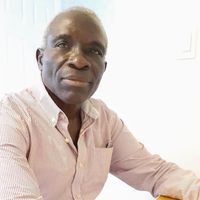PHOTO: J. Yanqui Zaza, LPP Acting Chairman
By Judoemue M. Kollie
As Liberia moves toward general and presidential elections in 2023, local media reports have it that citizens discussing the right choice of leader for the country’s presidency as someone of good health, age, wealth etc. rather than issues that can transform the economy.
For instance, Former Vice President and Unity Party standard bearer Joseph Nyumah Boakai in recent times has been at the center of the discussion.
There are some who think the Former Vice President is too old to lead the country.
The Liberia People’s Party (LPP), a party established in 1984 has said that perception about individual personality is limited and has warned that to move the country forward, there is a need that the debate focuses on candidates’ capabilities to address issues like, unemployment, improving revenue and health care delivery as well as food insecurity.
Since its establishment, the LPP has participated in several national elections, 1997, 2005 and last elections held in 2021.
The party said that individuals who do not share the view of debating on issues want to delay the debate until after elections.
“They have the fear that detractors would deliberately misinterpret good ideas and that many voters are not educated. The voters might be less interested in electoral matters and there are complex issues that might drive voters away.” The party said while, it is true that political parties should not dismiss any of these concerns, nonetheless, voters, advocates, and candidates should, every day, discuss how community leaders can play a role in managing community resources or collaborating with national leaders to promote peace and unity,” said the LPP in a press release.
“Candidates and community residents focusing on employment, healthcare, etc. might help discourage voters to focus less on country versus Congau divide or personality cult,” the LPP said.
The LPP said that without doubts, panelists of Civil Society, etc., even after elections, can develop simple and complex issues as documented within the Agenda for Transformation Strategy, Poverty Reduction Strategy, 2030 Vision or Pro-poor Agenda for Prosperity and Development.
“One of the many problems for not discussing issues before election is that neither elected officials nor appointed officials have ownership of issues, therefore, voters cannot hold them accountable.”
The party said interacting with voters frequently will create an environment conducive for voters to understand the issues and the cost and benefit analysis of each policy.
This approach might make the enforcement of policies effective. Meanwhile, according to the LPP, some errors by both previous and current government that informed voters would have assisted policymakers in minimizing would be depletion of commercial banks cash reserve at the Central Bank, the violation of the 2009 Public Financial Management (PFM) laws and the mismanagement of the Libyan government funded agriculture project that was introduced to employ hundreds of Liberians in the country’s agriculture sector.
“The depositors or Western Union customers will get their money on time from commercial banks if informed-voters discourage officials of the Central bank of Liberia from depleting commercial banks’ cash reserves and limit its borrowing to 10% of government revenue as stipulated by the 1999 Central Bank of Liberia Act.” The party said that it is observed that the Central Bank of Liberia in 2020 annual report shows that it borrowed USD $55M more than the USD$50M (USD $105M minus the 10% of the USD $500M government revenue. “By selling promissory notes to banks, the government reduces cash reserves at commercial banks, thereby, making it difficult for clients to get their money when they need it,” the Party said.
The party said that it is important that Liberia’s informed voters to discourage Liberian financial advisers from violating Liberia’s 2009 PFM Laws (i.e., laws on transparency and accountability). “The country’s violation of transparency and accountability laws encouraged the United States of America Department of State to list Liberia in a June 2021 report as one of the countries that has violated its own laws,” the LPP release stated.
The LPP further mentioned that Liberia’s informed voters, aware that the rice project in Lofa was launched to reduce food insecurity, and at the same time create jobs for our youths, would have advised former President Ellen Johnson Sirleaf to use the farm-equipment and produce food.
Also, they would have advocated for Liberia to allocate 10% of its government revenue as stipulated in the agreement signed during the 2011 Maputo Conference.
“Liberia’s informed citizens would advocate against businesses creating economic arrangement that encourages parents and employers to violate Child Abuse Labour Laws and employed school-aged children at Diamonds and Gold industries, Buy and sell industry, Firestone, etc,” the release added. It further said Liberia’s informed citizens would have discouraged financial advisers from demanding and receiving pensioners’ cash held by the Liberia National Social Security Welfare Corporation (NASSCORP), which is in violation of the 2009 PFM laws.
“Liberian authorities demanded and received cash from NASSCORP and classified the transactions as payments for dividends and payments to purchase government treasury bonds respectively in 2019 and 2020,” the LPP release added. According to the release, Liberia’s informed voters, in 2018, would have agreed with President George that Liberia was broke, and disagreed with former President Ellen Johnson Sirleaf who stated that Liberia held USD $153M cash reserves.
The LPP release added that the former President included amounts of “Special Drawing Rights” (i.e., credit privileges of the International Monetary Fund) as part of Liberia’s net international foreign exchange reserves.
“In 2009, her administration began including the “Special Drawing Rights” (SDR) as part of Liberia’s excess cash reserves. On page # VIII of the 2009 Central Bank of Liberia annual report, the former governor of the Central Bank stated that Liberia’s net international foreign exchange cash reserves increased from USD $49M in 2008 to USD $269M in 2009, principally because of “SDR.” Past and current administrations usually overstate Liberia’s cash position to ill-advise stakeholders for Liberia to borrow more money,” the LPP release concluded.

